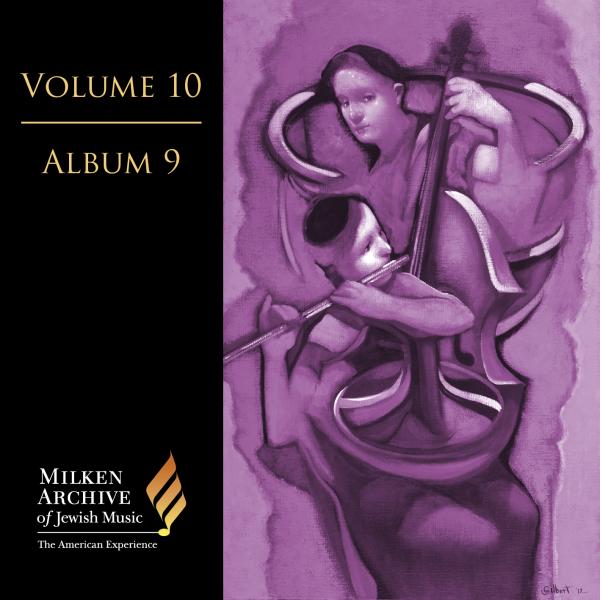Tracks
Track |
Time |
Play |
| I. Supplication: Elohenu Ve’lohey Avotenu | 08:54 | |
| II. Elegy (memories, bitter and sweet…) | 5:05 | |
| III. Intermezzo: Tango Dorfman, Allegro moderato | 06:05 | |
| IV. Recitative and Toccata Exorcista | 13:56 |
Liner Notes
In reflecting on his Odessa Trio, Ofer Ben-Amots has pointed to a Russian tradition of composing piano trios in memory of great artists, mentors, or close friends. It was in this tradition, he observes, that Tchaikovsky’s Piano Trio in A Minor (Op. 50), titled In Memory of a Great Artist, was dedicated to the Russian (Jewish by birth) pianist Nikolai Rubinstein. In similar vein, Arensky’s Piano Trio No. 1 in D Minor was written in memory of the legendary Russian cellist Karl Davidoff; and Shostakovich’s monumental Trio No. 2, Op. 67 was composed in memory of his closest friend Ivan Sollertinsky, who had died suddenly at the age of forty-one.
Odessa Trio is dedicated to the memory of Ben-Amots’s principal teacher, mentor, and dear friend, Joseph Dorfman, who died unexpectedly of an apparent heart attack in 2006 in Los Angeles during a piano recital he was performing there at one of the city’s largest synagogues.
Dorfman was born in Odessa in 1940, where he studied at the P. Stolyarsky School of Music and at the Odessa Conservatory—and then at the Gnessin Russian Academy of Music in Moscow, where he received his doctorate in 1971. While in his native city, he served as chairman of the Young Composers Section of the Odessa Composers League, and he became increasingly interested in Jewish art as well as folk and liturgical music.
Long before Dorfman’s birth, Odessa had been an important center of Russian Zionist activity and of the revival of modern Jewish—in particular, modern Hebrew—culture. His family was part of the intelligentsia and firmly oriented along Zionist lines, and on his father’s side there had been many generations of cantors and rabbis. In 1973 he emigrated to Israel, where he became a professor of composition and theory at the Rubin Academy of Music at Tel Aviv University. By the first few years of the 21st century he had become one of the most prolific Israeli composers of his generation, with about one hundred works to his credit in nearly every genre. His music encompasses a broad range of techniques and styles, from traditional to graphic and semi-graphic notation, and from conventional instrumentation to electronic music. Through his role in an independent composers group known as Acoustic 7-11, he worked with colleagues to introduce the music of foreign avant-garde movements to Israel.
Odessa Trio is so titled in recognition of Dorfman’s birthplace—the city where his musical life also began. A principal motive that unites the musical material is what Ben-Amots calls the “musicalization of Dorfman’s name,” viz., the conversion of his name into a musical cryptogram: Do-Re-Fa-Mi-La (C-D-F-E-A).
The first movement is based on the composer’s own manner of intoning, when he serves as a ba’al t’filla (lay cantor) for synagogue services, the liturgical incipit elohenu velohei avotenu (Our God and God of our fathers) that introduces a number of prayer texts. The second movement states the musical cryptogram for the first time, initially vigorous and decisive in presentation. The movement proceeds, however, in what the composer calls a “dark, romantic, and somewhat ‘Chopinesque’ mood.” The third movement, “Intermezzo,” is a tango in which the “Dorfman cryptogram” motive is the driving musical idea. This movement offers light, nearly humorous contrast to the others. The concluding movement returns to modalities of Hebrew liturgical delivery, moving—through dramatic rhythmic development—from slow passages that evoke the mood of prayer and cantorial recitatives to a climactic burst of loud shofar calls. The musical material for this movement was taken from the composer’s chamber opera The Dybbuk. The middle section, “Toccata Exorcista,” is the depiction of the exorcism scene in An-Ski’s play.
Odessa Trio concludes with a slow, quiet, serene, and of course wordless prayer.
Credits
Composer: Ofer Ben-AmotsPerformers: Dénes Karasszon, Cello; Elena Lüthi, Piano; Deborah Spiegel, Violin
Additional Credits:Publisher: The Composer's Own Press
